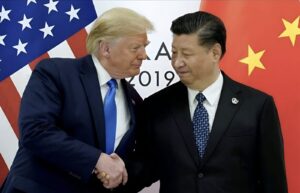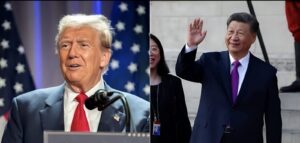The recent U.S.-China trade truce reached in London failed to address critical export restrictions related to national security—an unresolved issue that could hinder progress toward a broader agreement, according to two sources familiar with the talks, Reuters reported.
Beijing has yet to approve export clearance for certain specialized rare-earth magnets required by U.S. Military contractors for fighter jets and missile systems, according to sources. Meanwhile, the U.S. continues to restrict China’s access to advanced artificial intelligence chips over concerns they could be used for Military purposes.
During trade talks in London last week, Chinese negotiators appeared to tie the easing of export restrictions on Military-grade rare earth magnets to the U.S.’s ongoing curbs on advanced AI chip exports to China. This development marks a shift in the negotiations, which initially focused on issues such as opioid trafficking, tariffs, and China’s trade surplus, but have now pivoted toward export control disputes.
Additionally, U.S. officials signaled plans to extend existing tariffs on Chinese goods for another 90 days beyond the August 10 deadline agreed upon in Geneva last month, both sources said—indicating that a long-term trade agreement between the world’s two largest economies is unlikely in the near future.
The two individuals who spoke to Reuters about the London talks requested anonymity due to the sensitive nature of the discussions, which both governments have kept under strict confidentiality. The White House, State Department, and Department of Commerce did not immediately respond to requests for comment. Similarly, China’s Foreign and Commerce Ministries did not reply to faxed inquiries.
President Donald Trump on Wednesday hailed the handshake agreement reached in London between U.S. and Chinese negotiators as a “great deal,” stating, “We have everything we need, and we’re going to do very well with it. And hopefully they are too.”
Meanwhile, U.S. Treasury Secretary Scott Bessent emphasized that there would be no “quid pro quo” involving the relaxation of AI chip export restrictions to China in return for access to rare earth materials.
China Offers “Green Channel” for Rare Earth Exports, But Military -Grade Materials Remain Off the Table

China’s stranglehold on the supply of rare-earth magnets critical for advanced weapons systems continues to pose a major point of tension. The country dominates global production and maintains a near-monopoly on the refining and processing of these essential materials.
A Geneva agreement last month aimed at easing bilateral tariffs from punishing triple-digit levels began to unravel due to Beijing’s restrictions on critical mineral exports imposed in April.
In response, the Trump administration introduced new export controls blocking shipments of semiconductor design software, jet engines for Chinese-made aircraft, and other high-tech goods to China.
During the London talks, China reportedly pledged to expedite rare-earth export approvals for non-Military U.S. manufacturers, out of the tens of thousands of pending applications, according to one source. These export licenses would be valid for six months. Beijing also proposed creating a “green channel” to fast-track approvals for trusted American firms.
Initial signs were encouraging, with Chinese rare-earth magnet producer JL MAG Rare-Earth announcing on Wednesday that it had secured export licenses covering shipments to the United States. China’s Commerce Ministry also confirmed it had approved some “compliant applications” for export.
However, China has not relented on exports of certain specialized rare earths—such as samarium—that are critical for Military use and remain excluded from the fast-track process agreed upon in London, the two sources said. In contrast, automakers and other commercial manufacturers primarily require rare earth magnets like dysprosium and terbium.
Major Sticking Points Remain
The hastily arranged trade meeting in London came on the heels of a phone call last week between President Donald Trump and Chinese President Xi Jinping. During the call, Trump stated that U.S. tariffs on Chinese goods would be set at 55%, while China had agreed to impose a 10% tariff on imports from the United States.
Tariffs, Fentanyl, and Diminishing Hopes for Breakthrough
President Trump initially imposed steep tariffs on China in retaliation for its significant trade surplus with the United States and Beijing’s alleged failure to curb the flow of fentanyl into the country.
Earths for Military china -U.S

However, Chinese analysts remain skeptical about the prospect of a broader breakthrough before the August 10 deadline set in Geneva.
“Temporary mutual accommodation of some concerns is possible, but the fundamental issue of the trade imbalance cannot be resolved within this timeframe, and possibly during Trump’s remaining term,” said Liu Weidong, a U.S.-China expert at the Chinese Academy of Social Sciences.
One source close to the London negotiations said extending the August deadline could give the Trump administration time to pursue a new legal basis—via the U.S. Trade Representative’s Section 301 authority—for maintaining or increasing tariffs, in case Trump loses the ongoing court challenge to the current measures.
Ryan Hass, director of the John L. Thornton China Center at the Brookings Institution, noted that unresolved issues highlight the administration’s challenges in advancing its trade agenda, given China’s leverage through its control over rare earths -(Military)
“It has taken the Trump team a few punches in the nose to recognize that they will no longer be able to secure another trade agreement with China that disproportionately addresses Trump’s priorities,” Hass said

